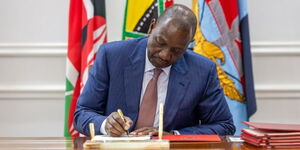Kenyan Manufacturers have raised concerns over the growing regional instability in the region, warning that the ongoing disruptions in neigbouring countries risk undermining the regional economy.
Kenya Association of Manufacturers (KAM) Chief Executive Officer Tobias Alando, while speaking on NTV on Tuesday, cited the internet shutdown in Tanzania during elections as a major setback, saying it had severely affected the telecom sector and disrupted essential services.
He explained that the blackout had ripple effects on traders, logistics operators, SMS services, and even petrol stations, causing wider economic losses.
Alando noted that regional security remains a key priority for businesses, as instability in Tanzania and Sudan continues to disrupt trade routes, travel, and supply chains.
At the same time, on behalf of the manufacturers, Alando called on the African Union and the East African Community (EAC) leaders to act swiftly to restore peace and address citizens’ grievances before the situation escalates further.
He further warned that such disruptions undermine investor confidence and threaten to roll back gains made in regional integration, particularly for manufacturers and exporters who rely on seamless movement of goods and data across borders.
“Leaders in the East African Community and across Africa must remember that they can be held accountable even after their terms end. Holding power does not grant the right to act without consequences,” he said.
Kenya and Tanzania are key trading partners with business exchanges across key sectors such as agriculture, where Kenyans import maize, onions, and tomatoes from the East African nation.
Meanwhile, Kenya’s trade with Tanzania has seen notable fluctuations over recent years. In 2024, exports from Kenya to Tanzania stood at Ksh67.20 billion, while imports reached Ksh58.72 billion, narrowing the trade surplus by Ksh8.48 billion.
Shortages of food, fuel, and money hit Tanzania, according to the Foreign, Commonwealth and Development Office (FCDO), after protests erupted on Wednesday last week during the country's general elections.
Despite the seemingly low turnout, Tanzania's electoral commission reported that the incumbent, Samia Suluhu, had won by a landslide with 98 per cent of votes, scooping 31.9 million votes out of the 32 million votes.
The commission further reported that the voter turnout was nearly 87 per cent, an assertion that the opposition and other election observers have termed as false.
Samia was sworn into office on Monday in Dodoma, where, together with other authorities in the East African nation, blamed the skirmishes on other nationalities, who, they maintained sneaked into the country.
This came following reports that Kenyans along the Lunga Lunga and Namanga borders attempted to gain entry to Tanzania to show solidarity with their neighbours.











